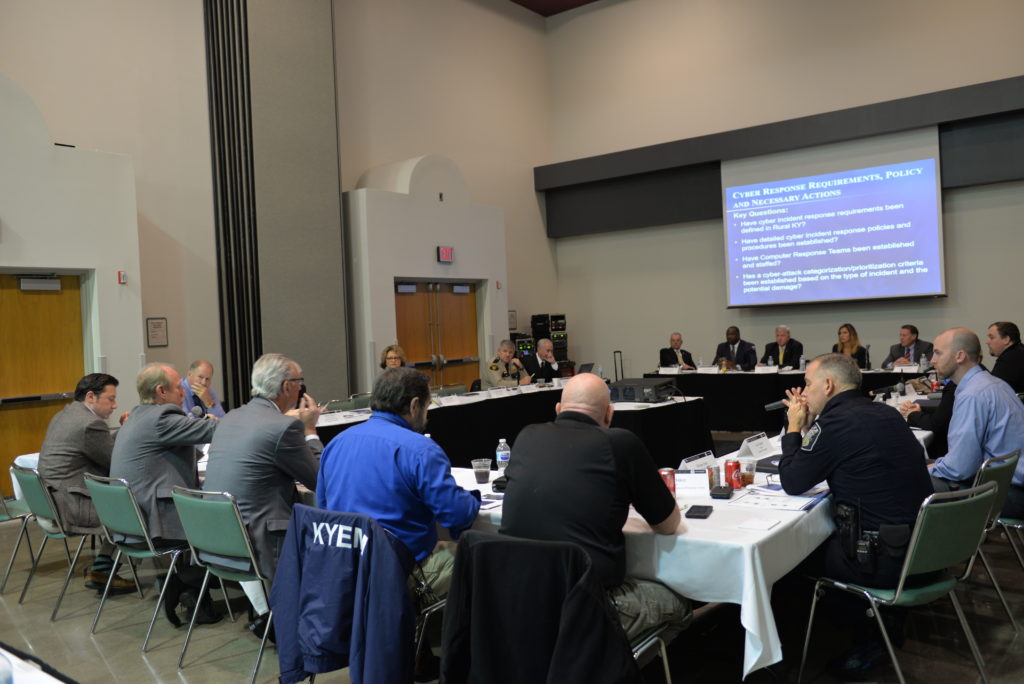 The Center for Rural Development recently hosted an executive education seminar on cyber security that partnered subject matter experts with local, state, and federal stakeholders.
The Center for Rural Development recently hosted an executive education seminar on cyber security that partnered subject matter experts with local, state, and federal stakeholders.
The half-day seminar, conducted by the Naval Postgraduate School and Center for Homeland Defense and Security, provided an open discussion for first responders, education representatives, government officials, and utility organizations to discuss what would happen if there were to be a cyber security attack that resulted in a loss of critical infrastructure and communication in rural Kentucky.
Lonnie Lawson, President and CEO of The Center for Rural Development, decided to host the seminar because he wanted to provide local stakeholders with the opportunity to begin the conversation on the topic of cyber security.
Kentucky Division of Emergency Management Area 10 Manager Don Franklin said more education is needed on the topic because a lot of stakeholders “don’t know that they don’t know” about what could happen if a cyber security attack were to occur.
The seminar provided attendees with discussion points including vulnerabilities, awareness, planning, and response.
“It’s not like an earthquake or a winter storm,” said Bob Stephen, Executive Director of Gryphon Scientific. “With a cyber threat, you don’t even know at first that you’ve even had an attack.”
Subject matter experts from various organizations were present at the meeting including Bob Stephen; Stan McKinney, Director of Executive Education Programs at the Center for Homeland Defense and Security; Jerome Hatfield, Senior Consultant at the Center for Homeland Defense and Security; Ron Leavell, Captain of the Seattle Police Department; Andy Mitchell, Senior Consultant on Homeland Security, Emergency Management, Law Enforcement, and Intergovernmental Policy; John P. Paczkowski, Senior Vice President of ICF International; Julie Parker, of Julie Parker Communications, LLC; and Susan Jones-Hard, Managing Director of Executive Education Programs at the Center for Homeland Defense and Security.
Lawson said it’s important to take a “whole community” approach to emergency preparedness. A cyber security attack could affect multiple agencies and organizations.
“If something happens, the whole community is affected,” Lawson said. “How do we address that?”
John Paczkowki, Senior Vice President of ICF International, a global consulting and technology firm, said Pulaski County is at an advantage because of the availability of The Center for Rural Development and the Rural Domestic Preparedness Consortium (RDPC).
The Center for Rural Development is the RDPC executive agent and trains rural first responders in all 50 states and six U.S. territories. On average, RDPC trains nearly 10,000 first responders every year on a wide range of topics including disaster recovery, school safety, mass fatalities, and pipeline security.
“One of the main concepts that we took away from this seminar is that we need more education on cyber security,” said Jason Mullins, RDPC Director. “As a training provider, we are constantly exploring different training subjects.”
Lawson and Mullins joined stakeholders from Pulaski County and the state of Kentucky at the seminar including: Jeff Hancock, Chief Deputy of the Pulaski County Sheriff’s Department; Chas Anderson, Doug Baker, and Joseph Farley of the Somerset-Pulaski County Special Response Team; Steve Butcher, Superintendent of the Pulaski County School District; Becki Childers and Aaron Ross of the Pulaski County 911 Center; Jason Childers, Cyber Security Analyst of the Kentucky Office of Homeland Security/Intelligence Fusion Center; Don Franklin, Kentucky Division of Emergency Management; Somerset Police Department Chief of Police William Hunt; Jeffrey Nash, Chief Information Officer at Somerset Independent Schools; Martin Shearer, Executive Director of Somerset-Pulaski County Development Foundation; and Julie Tucker, Director of Power Supply Planning at the East Kentucky Power Cooperative.
For more information on The Center for Rural Development, visit www.centertech.com or to learn more about RDPC, visit www.ruraltraining.org.




